
14 minute read
Reach Out, Raise Hope, Change Society...Run for Office
Social workers and politics may make strange bedfellows at first, but look closer and you’ll see an opportunity to improve the current political landscape. Social workers are expertly trained to work with communities, craft effective public policy and use their people skills to champion legislation. When social workers enter politics, they have the opportunity to not only develop policy which improve lives, but also to change the very image of politics by building trust, bridging differences and refocusing on the common good.
The National Association of Social Workers’ Code of Ethics specifically calls on social workers to engage in political action, and to advocate for changes in policy and legislation that promotes social justice. Social workers who become politicians uphold these principles as candidates and officials, bringing altruism and trustworthiness to government. After a divisive election season, what better way to rebuild trust in our political institutions than an infusion of social workers, who bring practical skills, community buy-in, a commitment to ethics and a passion for creating a more just society? To support potential candidates, the School of Social Work has developed a groundbreaking program to train social workers to go into politics. For a century, the School has been training practitioners, researchers and educators to be leaders in the field. With the introduction of the new Policy & Political Social Work curricular pathway, the School has created a program that trains MSWs to become effective leaders in the field of politics. The pathway’s curriculum provides students with a deep understanding of both policy and political issues from a social justice perspective. Designed and led by Clinical Assistant Professor Justin Hodge and Associate Professor Kristin Seefeldt, the pathway is one of the first programs in the country that provides social workers with political training as part of their MSW.
“I think social workers are the bestequipped people to engage in policy and political work, and be elected officials,” says Hodge. “If you look at all of the different areas that social work students learn about — interpersonal practice, community organizing, management, program evaluation, all of that — those are all essential skills that I would want any competent elected official to
have.” Hodge speaks from personal experience: he was recently elected a Washtenaw County Commissioner.

Seefeldt’s background is in public policy — in addition to her role at the School, she is associate director at U-M’s Poverty Solutions. Social workers, she says, have a different way of looking at problems, specifically in politics.


Clinical Assistant Professor Justin Hodge (top) and Associate Professor Kristin Seefeldt

“Our voice and our perspective are missing at the table,” adds Seefeldt. “There’s a focus on outcomes — for example, how can we move people off public programs and into work, instead of thinking about how we can make sure families are supported and are able to find jobs which will support them. Social workers have a different way of looking at issues and a different way of framing problems. And I think our voice needs to be louder, particularly as we have increasing inequality on so many fronts.”
Hodge and Seefeldt have designed a curriculum that builds on the strengths of an MSW degree. Like each of the new pathways, the Policy & Political Social Work curriculum begins with foundational social work courses, followed by a pathway-specific curriculum. They build skills by creating policy documents — briefs, memos, testimonies — which they share with stakeholders in the community.
Emily Anderson, MSW ’20, recently completed a yearlong field placement in the office of Detroit City Council Member Raquel Castañeda-López. “As a policy team intern, I actively used the analysis skills we learned in class to support the council member with the standing committees she was a part of. I also feel confident that the skills I learned in Political Social Work classes will prove to be invaluable as a Presidential Management Fellow.” Anderson hopes to work as a policy analyst for either a governmental agency or for an elected official and will begin her career as a Presidential Management Fellow, the prestigious government leadership development program. “I have learned how to conduct policy analysis, and understand the language that comes with it,” adds Kaelyn Lewis, MSW ’20. “My coursework prepared me to be a qualified candidate for a host of policy jobs because of the hard skills I’ve been able to develop.” The pathway, says Seefeldt, provides students with the knowledge and skills to land jobs in think tanks and as policy analysts — the same sort of jobs that, right now, are predominantly held by those with a Master of Public Policy. “There’s a lot of ways to be involved in the political sphere — you don’t have to be the person in front — you can be behind the scenes and there’s a really important role to be played on the advisory side as well.”
In addition, the rigorous coursework provides social work students with the foundation they need to take policy classes through other graduate schools and units on campus. After he received his MSW from the School in 2013, Hodge initially worked in clinical settings while serving in a series of community and government advisory roles. “When I was practicing clinical
social work, I was also serving on a civil rights board, where we would advise the city council on social policy issues and civil rights issues. That’s a space that’s usually dominated by lawyers and businesspeople,” said Hodge. “As a social worker, I was able to provide a very different — and valuable — perspective.”
The ability to make an impact particularly resonated for MSW Student Rikki Morrow-Spitzer. “The Political Social Work course encouraged each of us to make changes in our own communities, in a range of ways that would feel meaningful to us. It was empowering to see how each member of the class took a different approach.” “Public policy really comes out of economics, and economics has a very particular lens through which it looks at issues. MSWs put people first. When you know that decisions have real consequences for individuals and families, that makes a huge difference in approach,” Seefeldt explains. “Our students really want to make change,” adds Seefeldt. “They look around, see all sorts of problems and feel a real sense of urgency. It’s not just about getting a job: they have a commitment to making a different world. That gives me a lot of optimism and hope.” “I always encourage my students and other social workers to run for office,” says Hodge. “I know that’s not the right thing for everybody. But there’s a place to engage in politics for every social worker, whether it’s doing voter empowerment work and getting communities to understand their own political power, or getting appointed to different boards and commissions, where you can gain handson policy experience working with other elected officials.”
Intrigued? Inspired? It’s never too late to go into politics. In addition to this new pathway, the School of Social Work offers a continuing education online certificate in Political Social Work. Learn more about how you can make an impact in politics: ssw.umich.edu/r/
politicalsocialworkcertificate

The School of Social Work is proud to have many alumni who hold political office — through their vision and leadership, they are creating legislation that improves the lives of individuals and communities. We spoke with a number of them — including some newly elected who had yet to take office — about how they incorporate their social work values into politics.
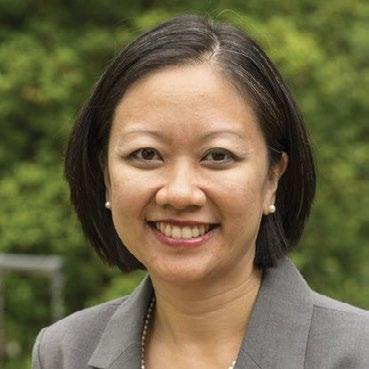

Kathy KL Tran, MSW ’03 Virginia House of Delegates Member, 42nd District
“I came to this country as a boat refugee from Vietnam when I was almost two years old. I first ran for office in 2017 to safeguard and advance hope, opportunity and freedom — the values which my parents risked our lives for. I have had the honor of serving two terms and am running for reelection this year. “Social workers bring important perspectives to elected office. We center justice and equity in our policymaking, having seen firsthand how laws impact children, families and vulnerable communities. We also believe in the importance of building coalitions because we understand the intersectionality of systemic injustices. “To build the bench of future social workers in policy, I have served as a field placement for social work students. I hope that more social workers will serve in all levels of government and step up to run for office.”
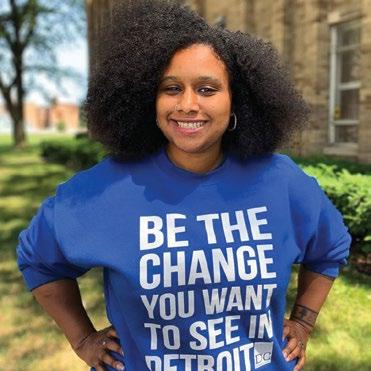
Misha Stallworth, MSW ’12 Detroit School Board Member
“I first ran for office in 2016 and was elected the youngest-ever member of the Detroit School Board. I was recently reelected this past November. I ran initially because I believed I had unique skills and perspectives to offer to my community which would improve the educational experience of Detroit students, most of whom are Black and many of whom are experiencing poverty. This makes our public education system one of the most important systems they will ever engage with. “The work I’ve championed over the last four years has focused on organizational culture, social and emotional health and community engagement. I’ve focused on those areas because of my unique lens: I am concerned with what’s going on with people — their challenges and trauma — and how that connects to our larger community.”


Oscar Delgado, MSW ’10 City Council Member, Ward 3 | Reno, Nevada
“I encourage social workers to go into politics with your eyes wide open, your ears wide open and knowing that you don’t know everything. And that’s okay. If you’re passionate about wanting to make change, and about listening to your community, then that’s something you should strive to do. If you’re passionate, people listen, but you need to learn how to work with others so that you aren’t siloed when the decisions are being made. “When I ran for office, I ran against the old guard. I had to run on my ideals, but also know that I had to be open-minded and understanding, and that I would have to learn how to make compromises if I wanted community work to move forward.“

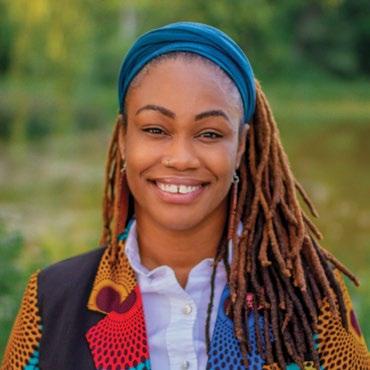
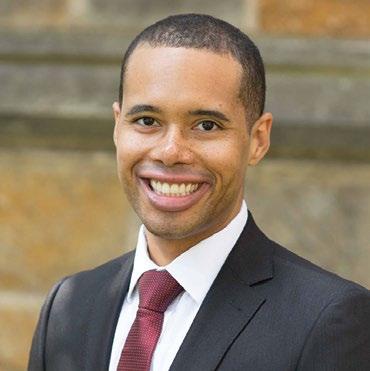
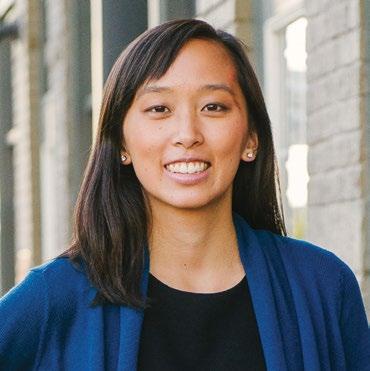
Krystle DuPree, MSW ’19 Ann Arbor Public School Board of Education Member
“Social workers have a unique set of skills that allows us to look at individuals and how their environment impacts them. Many of the social group theories that we are taught I applied during my campaign. “A direct message from a parent in the community inspired me to run for office. My son and I have had a rocky time in Ann Arbor public schools. We have experienced some of the wonderful things in the district, yet also the things that make this space difficult to navigate for people who are Black, “poor” and with invisible disabilities. Ableism and classism are just as real as racism in Ann Arbor. Some of us navigate these layers daily and we deserve a seat at the table. I have always felt that the school board needed a parent voice that is not privileged and is unfiltered.”
Justin Hodge, MSW ’13 Washtenaw County (MI) Commissioner
“We need social workers in politics because we are so well equipped to work on and develop policies that promote social justice and equity. I’m often the only social worker in the room, and I have a different perspective on how policy impacts people’s lives. Whether discussions are about health care or law enforcement, having a social work perspective as part of decision-making is critical for public policy that puts people first. “The number of social workers in politics is growing, but it’s not enough. As we’ve seen, our democracy is fragile and in need of protection; social workers can be the guardians that we need. By applying our understanding of the importance of democracy with our ability to engage with people, we are uniquely positioned to do this duty. Between our code of ethics and our ability to solve problems in thoughtful and considerate ways, having social workers in elected office can change how people view politics and politicians for the better.”
Stephanie Chang, MSW ’14 Michigan Senate Senator, District 1 | Minority Floor Leader
“It is important to have social workers in politics because we know what our most vulnerable community members are facing and see issues from a social justice lens. Social workers must be involved in shaping policy so that we can build solutions with marginalized community members. For example, I look at issues for what the impact may be on people based on race, poverty, disability, gender and other social identities. I try to work together with my residents to create legislation that promotes equity and to organize around issues in our community. The vast majority of bills I have introduced are related directly to addressing racial, economic, environmental and social justice.”


Charlie Cavell, MSW ’13 Oakland County (MI) Commissioner
“My life experiences led me to want to make a difference. I was raised by a single parent for most of my childhood, then adopted at 16. At school, I interacted with Child Protective Services and always thought my social workers were ineffective. What I learned was that it wasn’t the social workers, it was the systems and policies. I ran for office so I could make better policies. “In our democracy, politics should be something accessible to everyone. You don’t have to be an expert, but you do need to understand the values and priorities of your community. On my campaign, we created the goal of ‘transcending transactional politics.’ We are trying to break away from the mindset that government is the problem, and create a culture that is open, transparent and inclusive by inviting everyone to show up.”

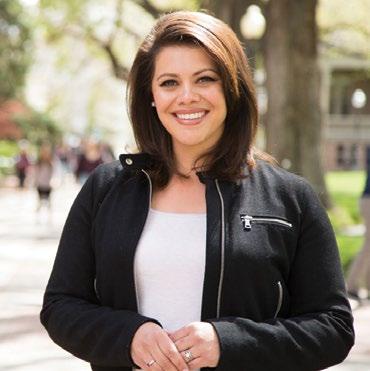
Raquel Castañeda-López, MSW ’07 City Council Member, Detroit City Council District 6
“My social work training shapes my approach to everything; it’s how I choose to live my life, and the profession seamlessly fits this in. It’s having the community as the focus and considering service — and serving people — to be the ultimate goal. “Running for office wasn’t a dream of mine; I was recruited by my neighbors, by community members and by Congresswoman Rashida Tlaib. Women need to be asked to run for office; we don’t necessarily see ourselves in those roles. I love it and feel very lucky and privileged to serve in this way. “Many social workers come from marginalized communities, and we need these communities represented in leadership positions. We need those with lived experiences to bring their stories and values to the table and benefit from these discussions. The only way democracy will improve is having people like us run for office and fill these positions.”
Teresa Benitez-Thompson, MSW ’04 Nevada Assemblywoman, District 27 Majority Floor Leader
“It’s important to have social workers in politics because the more representative democracy reflects your community, the better policies you’re going to get in the long run. And I’ve always been an advocate for professional diversity, because you can end up with a lot of holes in terms of experience and subject matter knowledge at the elected level. That’s really obvious in terms of social workers. My first session began in 2011 and since that time, I’ve been the only social worker elected to the Nevada state legislature. I need some company! We make better policy if we have social workers — and people who have our experience and backgrounds — at the table. “If you really believe in making macro change, that has to happen at an elected level. Nonprofits and grassroots organizations do a lot of excellent work, but ultimately you’re always coming up against a power dynamic where politics are typically in play. So as social workers, we need to be involved in political settings where big decisions are made that impact our communities.”








